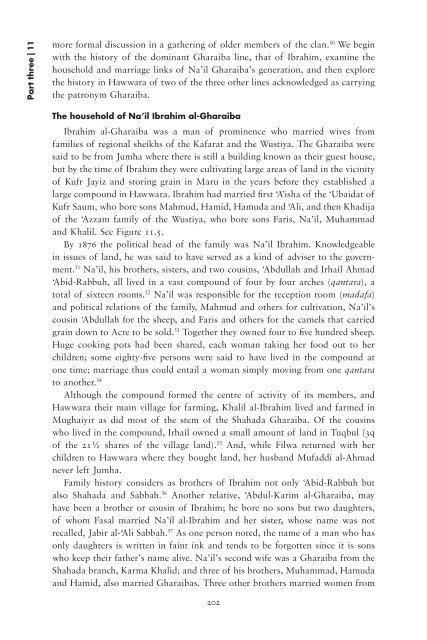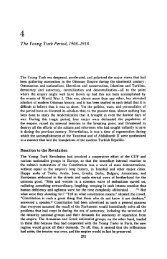Governing property, making the modern state - PSI424
Governing property, making the modern state - PSI424
Governing property, making the modern state - PSI424
You also want an ePaper? Increase the reach of your titles
YUMPU automatically turns print PDFs into web optimized ePapers that Google loves.
Part three | 11<br />
more formal discussion in a ga<strong>the</strong>ring of older members of <strong>the</strong> clan. 50 We begin<br />
with <strong>the</strong> history of <strong>the</strong> dominant Gharaiba line, that of Ibrahim, examine <strong>the</strong><br />
household and marriage links of Na’il Gharaiba’s generation, and <strong>the</strong>n explore<br />
<strong>the</strong> history in Hawwara of two of <strong>the</strong> three o<strong>the</strong>r lines acknowledged as carrying<br />
<strong>the</strong> patronym Gharaiba.<br />
The household of Na’il Ibrahim al-Gharaiba<br />
Ibrahim al-Gharaiba was a man of prominence who married wives from<br />
families of regional sheikhs of <strong>the</strong> Kafarat and <strong>the</strong> Wustiya. The Gharaiba were<br />
said to be from Jumha where <strong>the</strong>re is still a building known as <strong>the</strong>ir guest house,<br />
but by <strong>the</strong> time of Ibrahim <strong>the</strong>y were cultivating large areas of land in <strong>the</strong> vicinity<br />
of Kufr Jayiz and storing grain in Maru in <strong>the</strong> years before <strong>the</strong>y established a<br />
large compound in Hawwara. Ibrahim had married first ‘A’isha of <strong>the</strong> ‘Ubaidat of<br />
Kufr Saum, who bore sons Mahmud, Hamid, Hamuda and ‘Ali, and <strong>the</strong>n Khadija<br />
of <strong>the</strong> ‘Azzam family of <strong>the</strong> Wustiya, who bore sons Faris, Na’il, Muhammad<br />
and Khalil. See Figure 11.5.<br />
By 1876 <strong>the</strong> political head of <strong>the</strong> family was Na’il Ibrahim. Knowledgeable<br />
in issues of land, he was said to have served as a kind of adviser to <strong>the</strong> government.<br />
51 Na’il, his bro<strong>the</strong>rs, sisters, and two cousins, ‘Abdullah and Irhail Ahmad<br />
‘Abid-Rabbuh, all lived in a vast compound of four by four arches (qantara), a<br />
total of sixteen rooms. 52 Na’il was responsible for <strong>the</strong> reception room (madafa)<br />
and political relations of <strong>the</strong> family, Mahmud and o<strong>the</strong>rs for cultivation, Na’il’s<br />
cousin ‘Abdullah for <strong>the</strong> sheep, and Faris and o<strong>the</strong>rs for <strong>the</strong> camels that carried<br />
grain down to Acre to be sold. 53 Toge<strong>the</strong>r <strong>the</strong>y owned four to five hundred sheep.<br />
Huge cooking pots had been shared, each woman taking her food out to her<br />
children; some eighty-five persons were said to have lived in <strong>the</strong> compound at<br />
one time; marriage thus could entail a woman simply moving from one qantara<br />
to ano<strong>the</strong>r. 54<br />
Although <strong>the</strong> compound formed <strong>the</strong> centre of activity of its members, and<br />
Hawwara <strong>the</strong>ir main village for farming, Khalil al-Ibrahim lived and farmed in<br />
Mughaiyir as did most of <strong>the</strong> stem of <strong>the</strong> Shahada Gharaiba. Of <strong>the</strong> cousins<br />
who lived in <strong>the</strong> compound, Irhail owned a small amount of land in Tuqbul (3q<br />
of <strong>the</strong> 21½ shares of <strong>the</strong> village land). 55 And, while Filwa returned with her<br />
children to Hawwara where <strong>the</strong>y bought land, her husband Mufaddi al-Ahmad<br />
never left Jumha.<br />
Family history considers as bro<strong>the</strong>rs of Ibrahim not only ‘Abid-Rabbuh but<br />
also Shahada and Sabbah. 56 Ano<strong>the</strong>r relative, ‘Abdul-Karim al-Gharaiba, may<br />
have been a bro<strong>the</strong>r or cousin of Ibrahim; he bore no sons but two daughters,<br />
of whom Fasal married Na’il al-Ibrahim and her sister, whose name was not<br />
recalled, Jabir al-‘Ali Sabbah. 57 As one person noted, <strong>the</strong> name of a man who has<br />
only daughters is written in faint ink and tends to be forgotten since it is sons<br />
who keep <strong>the</strong>ir fa<strong>the</strong>r’s name alive. Na’il’s second wife was a Gharaiba from <strong>the</strong><br />
Shahada branch, Karma Khalid; and three of his bro<strong>the</strong>rs, Muhammad, Hamuda<br />
and Hamid, also married Gharaibas. Three o<strong>the</strong>r bro<strong>the</strong>rs married women from<br />
202












